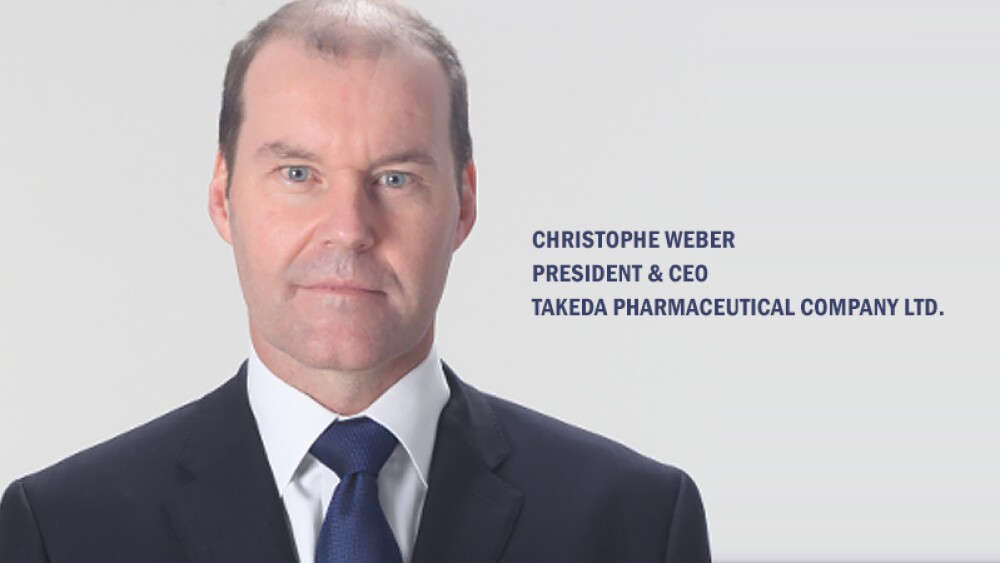September 5, 2017
By Alex Keown, BioSpace.com Breaking News Staff
BOSTON – As Japan-based pharmaceutical company Takeda positions itself as a global leader through greater internationalization, the company is establishing a massive presence in Boston and the surrounding area.
In July the Osaka, Japan-based company announced it was reducing its workforce in the greater Chicago area and transitioning hundreds of positions to Boston. For the past couple of years, Takeda has slowly been moving its Illinois-based research and development and vaccine business units to Boston and Cambridge, Mass. At the end of July, Takeda employed approximately 2,150 people in the Boston area. A greater presence in Boston, as well as other biotech hotspots around the globe, is part of the company’s key to developing a stronger international profile.
In an interview with CNBC earlier today, Christophe Weber, Takeda’s chief executive officer, said the key to the company’s growth is globalization. Since assuming the helm of Takeda, Weber, the first non-Japanese CEO of Takeda, has been under pressure to generate greater profits for the company, CNBC noted. Internationalization is part of his plan, according to the report.
One of Weber’s plans to achieve a stronger global strategy is to have many of Takeda’s Japanese employees spend some time in Boston and some U.S. employees to spend time in Japan. It’s a way to foster an “exchange” mentality, he told CNBC.
“We are glad to see so many Japanese [employees] moving to Boston, but we also want our researchers in Boston ... to work very well with our Japanese side here,” Weber told CNBC.
He said the goal is for the company to begin launching products globally, as opposed to a country-by-country basis. It intends to grow by focusing on three therapy areas—gastroenterology, oncology and the central nervous system. The company’s primary R&D is conducted in the United States.
Throughout the year, Takeda has been forging multiple collaborative deals to enhance its position and expand its pipeline.
Takeda began the year by acquiring Ariad Pharmaceuticals for $5.2 billion. The deal expands Takeda’s oncology pipeline with the inclusion of Iclusig for chronic myeloid leukemia (CML) and a subset of acute lymphoblastic leukemia (ALL), and brigatinib, still in trials for a subset of non-small cell lung cancer (NSCLC) patients.
In July, Takeda acquired development and commercialization rights for Tesaro’s Zejula (niraparib) in Japan, South Korea, Taiwan, Russia and Australia. Takeda said it has development rights for niraparib for the treatment of all tumor types in Japan, and all tumor types excluding prostate cancer in the other previously mentioned companies.
In April, Takeda signed a deal with Somerville, Mass.-based Finch Therapeutics to jointly develop FIN-524, a live biotherapeutic product to treat inflammatory bowel disease.
Earlier this month, Takeda and Cambridge, Mass.-based startup Cardurion Pharmaceuticals forged a new cardiovascular development deal. The two companies will focus on developing next-generation therapeutics for the treatment of heart failure and other cardiovascular diseases.
In August Takeda also struck a deal with Texas-based Molecular Templates, Inc. to develop oncology therapies. The collaboration will apply Molecular Templates’ engineered toxin bodies (ETB) technology platform to potential therapeutic targets provided by Takeda through a joint scientific committee of both companies.
More recently Takeda and pharma giant AstraZeneca established a R&D deal to develop the antibody MEDI1341 for the treatment of Parkinson’s disease. MEDI1341 is due to enter Phase I clinical trials later this year. Takeda is banking up to $400 million on the development of the drug. Under the terms of the agreement, AstraZeneca will lead Phase I development while Takeda will lead future clinical development activities.





